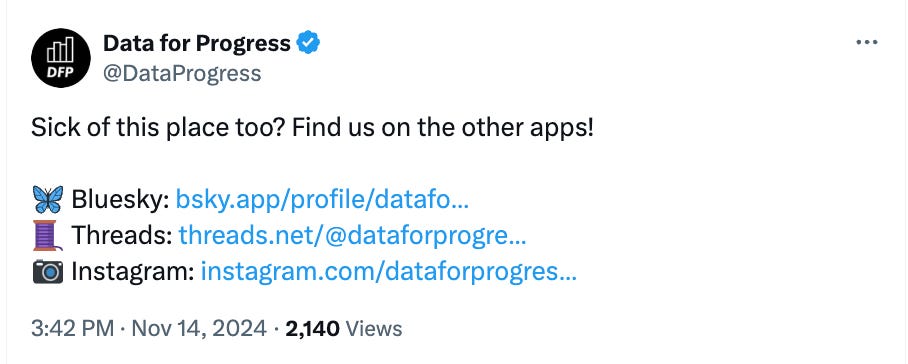Voters Say IRA Is Here To Stay
Welcome back to Data for Climate Progress — your one-stop shop for all things climate at Data for Progress.
Welcome back to Data for Climate Progress — your one-stop shop for all things climate at Data for Progress. Catch us here every month for our latest climate polling, juicy insights, and can’t-miss reading lists.
As always, we’d love to hear from you — drop us (Grace Adcox and Catherine Fraser) a line at gracea@dataforprogress.org and catherine@dataforprogress.org. Forwarded this email? You can subscribe below.
🦋 Psst … Join Us on Bluesky. The grass is definitely greener there than that other place. You can follow Data for Progress here and find a starter pack of DFP staff and friends here.
Remembering Jay Mehta, Our Dear Friend and Colleague
Data for Progress is devastated to hear of the passing of dear friend and colleague Jaykumar “Jay” Mehta. Jay recently led the launch of Jobs to Move America’s Community Benefits Agreements Resource Center. We had the pleasure to get to know Jay through our work at the intersection of climate, organized labor, and community benefits. He was a kind soul and a true light in the movement for worker power and economic justice.

Jay was brilliant, humble, funny, and thoughtful, epitomizing so many of the values of the climate justice and labor movements. He worked throughout his career to advance worker power in the U.S., first with Unite Here! and the Working Families Party, and later at Jobs to Move America.
We are grateful to have known Jay, and know he touched many lives all over the world. We hope you join us in remembering Jay. In lieu of flowers, the family kindly requests donations be made to Unite Here!, the union to which he devoted so much of his career.
Rest in peace, Jay. ♥️
Voters Don’t Want Law-Violating Developers to Get Federal Clean Energy Funding
Following the passage of the Inflation Reduction Act and Bipartisan Infrastructure Law, the U.S. is distributing billions of dollars in public funding for new clean infrastructure projects, like carbon capture, carbon dioxide removal, and renewable energy technologies, to project developers across the country (...for now). However, some developers currently receiving funds from the U.S. Department of Energy (DOE) for clean infrastructure projects are actively not complying with laws regulated by other federal agencies, like the Environmental Protection Agency and Department of Labor. For example, ExxonMobil’s Baytown Olefins Plant has committed at least 25 air quality violations over the last five years and been fined eight times by the Occupational Safety and Health Administration in the last decade, yet could receive more than $330 million in DOE clean energy grant funding. We find that voters don’t want federal funds to go to these kinds of bad actors. In fact, a strong majority of voters want developers to be required to be in compliance with worker safety (83%), clean water (80%), fair labor (78%), clean air (77%), and civil rights (74%) laws to receive federal funding. Read the full brief here.
Voters Say the IRA Is Here to Stay
While the next presidential administration is unlikely to provide much in the way of opportunities to craft bold, new federal climate policy, the groundbreaking Inflation Reduction Act (IRA) of 2022 can count on the enduring support of national voters in the coming term.
This month, Data for Progress collaborated with longtime partners at the Environmental Polling Consortium (EPC) to present the first wave of the new climate Community Poll. Along with climate movement allies like the Rural Climate Partnership, GreenLatinos, and the Sierra Club, DFP and EPC surveyed national registered voters, with oversamples of rural voters, Black voters, and Latino voters, to understand their awareness of and attitudes toward energy efficiency, home electrification, and the IRA.
We find an electorate with growing awareness of the IRA and its energy efficiency and electrification incentives: 63% of respondents say they are somewhat or very interested in pursuing home electrification and efficiency upgrades.
Moreover, in a year where costs undoubtedly played a major role in shaping electoral outcomes, voters see financial considerations as both major motivators and barriers to adopting such upgrades. Upgrade costs and a lack of certainty about qualifying for tax credits and rebates remain the two largest barriers to home electrification and efficiency upgrades for voters across demographic groups, while energy savings are the strongest motivation by far for pursuing electrification or efficiency upgrades.
Additionally, voters report that the components of the IRA that make them more likely to support federal investments in clean energy and energy efficiency focus on potential cost savings from energy efficiency upgrades and the creation of new clean energy jobs. In addition to voters overall, majorities of voters across partisanship favor keeping various IRA incentives, rather than ending them. After reading that components of the IRA may face repeal by a new administration, voters say that losing household energy savings or economy-wide air quality improvement benefits are among the most concerning outcomes of IRA repeal.
To learn more about the EPC Community Poll and see the slide deck and data, check out the EPC website here.
The EPC Community Poll is a collaborative project that will take place quarterly, alternating between waves of survey research and message testing. EPC is always looking for interested groups to provide input, so please reach out to EPC, or contact us and we can put you in touch with the team!













